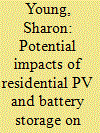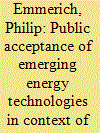|
|
|
Sort Order |
|
|
|
Items / Page
|
|
|
|
|
|
|
| Srl | Item |
| 1 |
ID:
181764


|
|
|
|
|
| Summary/Abstract |
Globally, 2.6 billion people still cook with biomass, resulting in interlinked health, environmental and drudgery challenges. The uptake of improved biomass cookstoves has barely kept up with population growth, yet SDG7 hopes for universal access to modern energy by 2030. This paper explores a potentially transformative new approach to facilitate access to affordable, reliable, sustainable and modern energy for cooking by leveraging rapid progress in electrification and falling prices of solar PV and lithium-ion batteries: battery-supported electric cooking. This paper presents empirical evidence on energy use, menu choices and cooking preferences from 83 households in 4 countries who transitioned from other fuels to electric cooking. A techno-economic model demonstrates that battery-supported electric cooking can be cost competitive with current expenditures on cooking fuels. No significant change in household menus occurred and the energy-efficient devices enabled 100% of everyday cooking with just 0.87–2.06 kWh/household/day. Our initial findings have already directly influenced the development of a 5-year UKAid-funded programme in collaboration with the World Bank, ‘Modern Energy Cooking Services’, and the new draft energy policy in Uganda. The paper concludes with two key policy recommendations: design lifeline tariffs inclusive of cooking and develop local markets for culturally-appropriate, quality-assured, energy-efficient cooking appliances.
|
|
|
|
|
|
|
|
|
|
|
|
|
|
|
|
| 2 |
ID:
171505


|
|
|
|
|
| Summary/Abstract |
Effective deployment of Distributed Energy Storage (DES) will depend in part on public attitudes and acceptance at both community and household levels. Here, we present the results of an exploratory survey to understand prospective public acceptance of DES technologies at household and community level in the UK (N = 949). The research design draws on previous qualitative technology acceptance work that was undertaken to inform the survey. We show that while the level of awareness of DES among the UK public is still very low, initial evaluation of information on domestic and neighbourhood battery storage is positive and evokes positive feelings that are significant predictors of positive attitudes. Moreover, the UK public has strong expectations about the technology, its benefits and its management. In particular, the results point to a bounded and place-based role for altruism: that people are more likely to accept energy storage facilities in their neighbourhood if they are for the benefit of that same neighbourhood. The results help us to understand public expectations of the technologies and the institutions relevant to decentralised energy design and deployment by commercial and public sector actors, as well as having implications for policy design and communication strategies.
|
|
|
|
|
|
|
|
|
|
|
|
|
|
|
|
| 3 |
ID:
175021


|
|
|
|
|
| Summary/Abstract |
Research on the politicization of science often highlights the role of the media or the effects of the public's prior beliefs. Less prominent are case studies addressing the direct communications from scientists working on a narrowly defined project. This paper introduces for consideration the United States Department of Energy-funded Joint Center for Energy Storage Research (JCESR), which fuses together basic research, battery design, and pathways to market. The central point is to assess whether, given its proximity to the climate change issue, JCESR's research has been politicized. Based on the results from interviews, observations, measures of public interest, and a survey of scientists working at JCESR, it is concluded that JCESR's next-generation battery research has avoided politicization and even thrived. This is attributed in part to bipartisan support among policy makers, the absence of any ideology-based impacts on beliefs about energy storage, and a perception among key actors that next-generation battery technology is not a pressing threat. JCESR also presents a collective ability to protect its scientific credibility while enhancing its political relevance. JCESR's battery storage research and development has been effectively buffered from the volatility of climate change.
|
|
|
|
|
|
|
|
|
|
|
|
|
|
|
|
| 4 |
ID:
166358


|
|
|
|
|
| Summary/Abstract |
Australia has one of the highest penetrations of residential PV in the world and is projected to see substantially more deployment in coming years, with a growing proportion of this being coupled with battery energy storage (BES). Previous analysis of the implications of these residential distributed energy resources (DERs) has tended to focus on the individual private benefits to households that deploy them, their direct technical and revenue impacts on network businesses, or broader electricity industry implications. This paper seeks to quantify the economic impacts of residential PV and BES on electricity network businesses, from residential to wholesale market region level. One key impact is reductions in network business revenues as households purchase less electricity from the grid. However, we also consider the potential savings for network businesses as these PV and BES deployments reduce peak network demand from residential to wholesale market level, a key driver of network investment and hence network business costs. Our findings for the Sydney region suggest that potential network investment cost reductions could even outweigh the loss of revenue. Tariff design will have a key role in ensuring that residential PV and BES deployment offers value both to households as well as network businesses.
|
|
|
|
|
|
|
|
|
|
|
|
|
|
|
|
| 5 |
ID:
169722


|
|
|
|
|
| Summary/Abstract |
Falling costs of solar PV and battery technologies are continuously changing the customer relationship with their electricity network. By managing their own self-generation, customers are able to place natural selection pressure on utilities to evolve. The devised techno-economic simulation model projects residential PV and battery investment decisions over 20 years in Perth, Australia to quantify the potential market impacts from policy and customer investment conditions. Using real-world demand and insolation profiles from 261 households, this research evaluates how cumulative customer PV and battery investments changes the network and market operating conditions, while under the influence of various feed-in tariff values. The results indicate that high feed-in tariff policy costs in the short-term, make it economically challenging to prevent or restrain significant residential PV-battery adoption in the longer-term. Moreover, continuous increases in residential PV-battery system installations eventually lead to annual net-exports substantially exceeding net-imports on the distribution network. This significant shift in network operation provides an opportunity for policymakers to utilise behind-the-meter PV-battery investments and decentralised energy markets to meet wider renewable energy and decarbonisation goals.
|
|
|
|
|
|
|
|
|
|
|
|
|
|
|
|
| 6 |
ID:
180848


|
|
|
|
|
| Summary/Abstract |
We analyze how tariff design incentivizes households to invest in residential photovoltaic and battery storage systems, and explore selected electricity sector effects. To this end, we develop an open-source electricity sector model that explicitly features prosumage agents and apply it to German 2030 scenarios. Results show that lower feed-in tariffs substantially reduce investments in residential photovoltaics, yet optimal battery sizing and self-generation are relatively robust. With increasing fixed parts of retail tariffs and, accordingly, lower volumetric retail rates for grid consumption, households have lower incentives for self-consumption. As a consequence, optimal battery capacities and self-generation are smaller, and households contribute more to non-energy power sector costs. A cap on hourly feed-in by households may relieve distribution grid stress without compromising PV expansion or prosumage models for households. When choosing tariff designs, policy makers should not aim to (dis-)incentivize prosumage as such, but balance effects on renewable capacity expansion and system cost contribution.
|
|
|
|
|
|
|
|
|
|
|
|
|
|
|
|
| 7 |
ID:
176806


|
|
|
|
|
| Summary/Abstract |
Technology acceptance represents a challenge for the successful implementation of emerging energy technologies. Building on previous literature, we developed and assessed a socio-psychological factor model, which we apply to three different energy technologies that are relevant to the German energy transition. Our model analyses factors such as trust in industry, trust in municipalities, perceived problems of the current energy system and environmental self-identity with regard to acceptance both in general (general acceptance) and in the context of a scenario featuring a nearby implementation (local acceptance). These factors are mediated by affect and perceived effects, including perceived benefits, costs and risks. We tested the applicability of our model across three different energy technologies: hydrogen fuel stations, biofuel production plants and stationary battery storage facilities. Our study confirms previous findings, which stress the relevance of psychological and social factors. It also extends the literature, testing a universal model across different technologies and examining acceptance on both the local and the general level. We explored the implications of our findings for the selected technologies and managerial practice.
|
|
|
|
|
|
|
|
|
|
|
|
|
|
|
|
| 8 |
ID:
181807


|
|
|
|
|
| Summary/Abstract |
Hawaii's 100% Renewable Portfolio Standard target has led to rapid growth in renewable generation resources. This has resulted in grid issues given the islanded nature of Hawaii's grid. The state has decided to use battery storage in its grid to address these issues. This motivates us to try to understand the various business models in the state and the minimum set of barriers that must be overcome for its successful deployment. We achieve the former by assessing the projects in the state and identifying the dominant business models. For the latter, we use a barrier-solution framework that posits the minimum set of barriers that must be met for the successful deployment of battery storage business models and we verify it by identifying the role of various policies/drivers in supporting these business models. As a result, we find predominantly three business models in Hawaii: Co-located Front-of-the-Meter, Behind-the-Meter, and Aggregated Behind-the-meter. We also verify that at least one barrier from barrier categories associated with market demand and project economics along with all the barriers related to interconnection and market participation must be addressed for successful deployment of battery storage. Based on these findings, we give recommendations to policymakers seeking to develop a battery storage market.
|
|
|
|
|
|
|
|
|
|
|
|
|
|
|
|
|
|
|
|
|